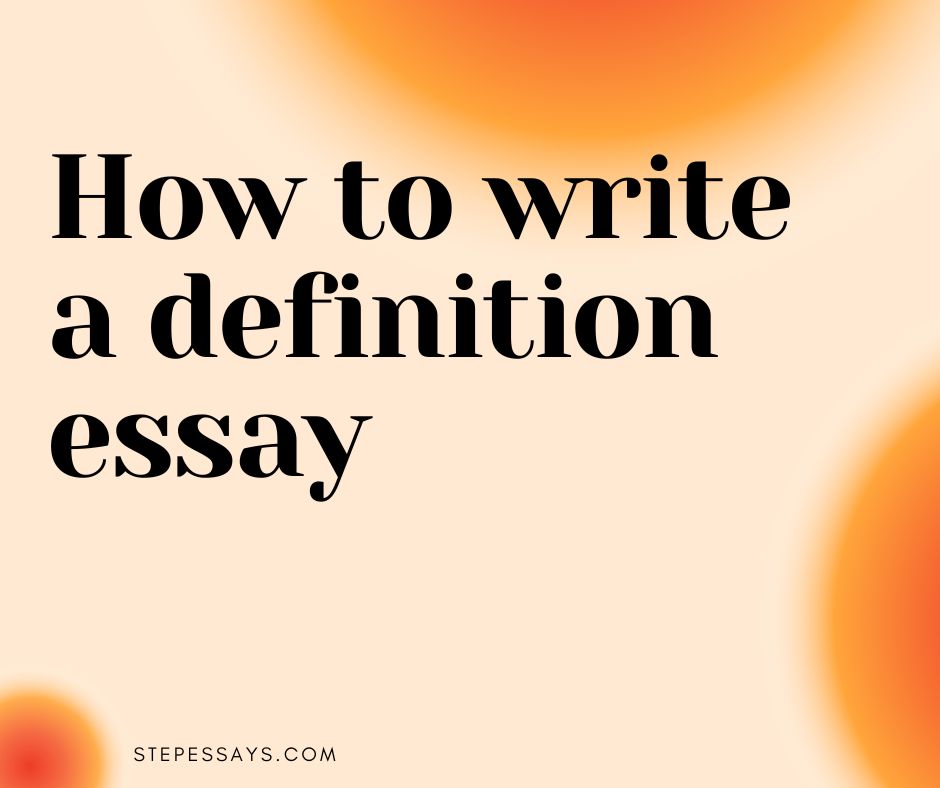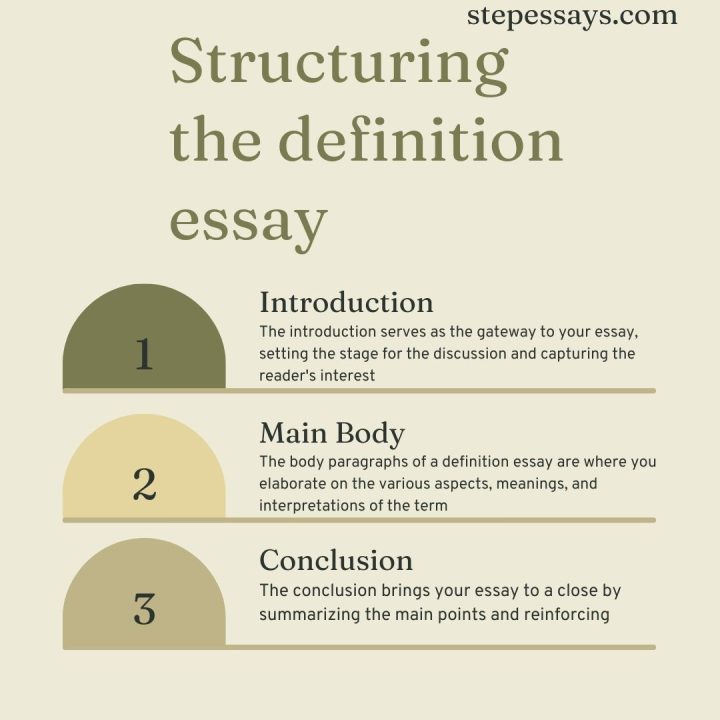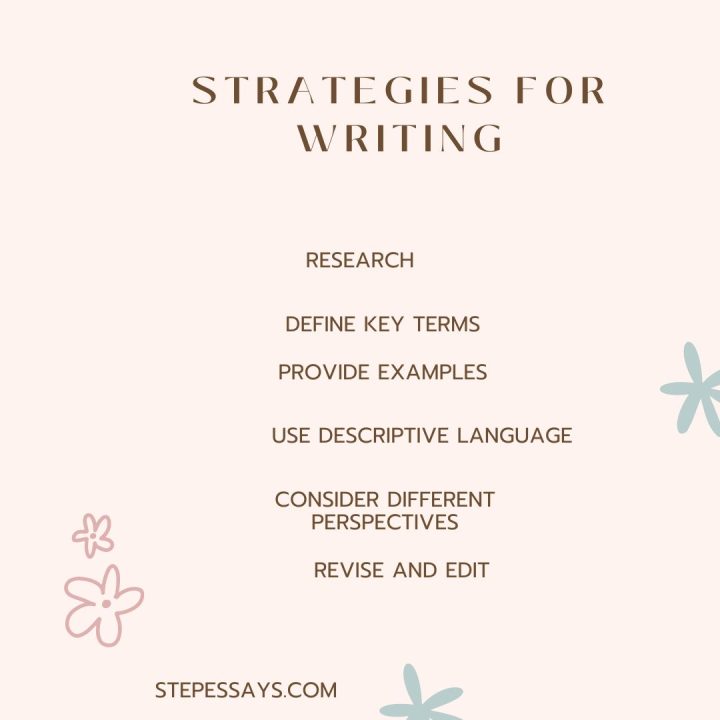Table of Contents
ToggleIntroduction
Writing a definition essay involves defining a term, concept, or idea in depth through various methods such as analysis, comparison, and explanation. The goal is not just to provide a dictionary definition but to explore the nuances and complexities of the chosen subject matter. In this essay, we will look into the specifics of crafting a definition essay, covering its structure, key components, strategies, and examples.

definition essay
Understanding the Definition Essay:
A definition essay is a type of academic writing that requires students to provide an extended definition of a chosen term or concept. Unlike a standard dictionary definition, which is often concise and straightforward, a definition essay explores the deeper meaning, interpretation, and significance of the term. It aims to offer readers a comprehensive understanding of the subject matter and may incorporate personal experiences, anecdotes, and examples to illustrate its points.
Choosing a Topic:
Selecting the right topic is indeed the cornerstone of a successful definition essay. It sets the stage for the entire writing process, influencing both the depth of analysis and the engagement of the audience. Here, we lookdeeper into each of the outlined tips for choosing a topic, understanding their importance and implications.
Familiarity:
Choosing a topic that you are familiar with and have personal experience or knowledge about is advantageous for several reasons. Firstly, it makes the writing process more manageable and enjoyable. When you have prior knowledge of the topic, you’re better equipped to articulate your thoughts and ideas effectively. Moreover, your personal connection to the topic can infuse passion and authenticity into your writing, making it more engaging for both you and your audience.
Complexity:
Opting for a topic that has multiple meanings or interpretations adds depth and richness to your essay. Instead of providing a straightforward definition, you have the opportunity to explore the nuances and complexities of the term, looking into its various dimensions and implications. This not only enhances the analytical rigor of your essay but also keeps your readers intellectually stimulated as they navigate through different perspectives and interpretations.
Controversy:
Selecting a term that is controversial or subject to debate invites critical inquiry and encourages the exploration of diverse viewpoints. Controversy sparks curiosity and engages readers by presenting conflicting opinions and arguments. As a writer, you have the opportunity to examine the root causes of the controversy, evaluate different arguments, and offer your perspective on the matter. By engaging with opposing viewpoints, you can foster a deeper understanding of the term and its implications, ultimately enriching the discourse surrounding it.
Relevance:
Choosing a topic that is relevant to your audience ensures that your essay resonates with them on a personal level. Relevance adds immediacy and significance to your writing, compelling readers to pay attention and invest themselves in the discussion. By addressing topics that are pertinent to your audience’s interests, concerns, or experiences, you can create a meaningful connection and elicit a stronger response. Moreover, relevance allows you to explore real-world applications of the term, demonstrating its importance and impact in contemporary contexts.
In summary, selecting the right topic for a definition essay requires careful consideration and deliberation. By prioritizing familiarity, complexity, controversy, and relevance, you can choose a topic that not only facilitates in-depth analysis and exploration but also captivates and resonates with your audience. Whether you’re looking into the complexities of a multifaceted term or unpacking the controversies surrounding a contentious issue, the key is to choose a topic that ignites curiosity, inspires inquiry, and fosters meaningful engagement.
Crafting the Thesis Statement:
Crafting a robust thesis statement is essential for a definition essay as it lays the groundwork for your argument and guides the reader through your analysis. Here, we look into each of the outlined tips for crafting a compelling thesis statement, elucidating their significance and impact on the overall effectiveness of your essay.
Clarity:
Ensuring clarity in your thesis statement is paramount to effectively communicate your stance on the term and the rationale behind your interpretation. A clear thesis statement provides readers with a concise understanding of the central argument of your essay, eliminating ambiguity and confusion. By clearly articulating your position on the term, you set clear expectations for your readers and facilitate their comprehension of your analysis. Clarity also enhances the persuasiveness of your thesis statement, making it more compelling and convincing.
Specificity:
Avoiding vagueness and broadness in your thesis statement is crucial for maintaining focus and coherence in your essay. A specific thesis statement hones in on a particular aspect or dimension of the term that you will be analyzing, providing a clear direction for your argument. By specifying the scope of your analysis, you can look deeper into the nuances and complexities of the term, enriching your essay with detailed insights and observations. Specificity also prevents your thesis statement from being overly simplistic or generic, ensuring that it remains engaging and thought-provoking for your readers.
Debatable:
Making your thesis statement debatable and open to interpretation is essential for fostering critical thinking and engagement from your audience. A debatable thesis statement invites readers to question and challenge your interpretation of the term, stimulating intellectual curiosity and encouraging active participation in the discussion. By acknowledging alternative viewpoints and potential counterarguments, you demonstrate intellectual honesty and openness to differing perspectives. This not only enriches the depth and complexity of your analysis but also elevates the overall quality of your essay by fostering a robust and dynamic dialogue.
In summary, crafting a compelling thesis statement for a definition essay requires careful attention to clarity, specificity, and debatability. By ensuring that your thesis statement is clear, concise, and specific, you provide readers with a roadmap for navigating your analysis and understanding your perspective on the term. Additionally, making your thesis statement debatable and open to interpretation encourages critical thinking and engagement, enriching the discourse surrounding the term and elevating the intellectual rigor of your essay. By adhering to these principles, you can create a thesis statement that serves as a solid foundation for your definition essay, guiding readers through a thoughtful and insightful exploration of the chosen term or concept.
Structuring the definition essay:

definition essay
Structuring a definition essay effectively is crucial for presenting your analysis in a coherent and compelling manner. Here, we’ll explore each section of the essay structure in detail, highlighting its purpose and providing tips for crafting impactful content.
Introduction:
The introduction serves as the gateway to your essay, setting the stage for the discussion and capturing the reader’s interest. To achieve this, consider the following elements:
- Introduction of the Term: Begin by introducing the term or concept you will be defining. Provide a brief explanation to ensure that readers understand the subject matter.
- Contextual Background: Offer relevant background information to contextualize the term within a broader context. This could include historical, cultural, or theoretical insights that help readers grasp the significance of the term.
- Thesis Statement: Present your thesis statement, which outlines your central argument or interpretation of the term. Make sure it is clear, concise, and specific, providing a roadmap for the reader to follow.
- Engaging Hook: Capture the reader’s attention with an engaging hook, such as a compelling quote, anecdote, or surprising fact related to the term. This encourages readers to continue reading and sets the tone for the essay.
Body Paragraphs:
The body paragraphs of a definition essay are where you elaborate on the various aspects, meanings, and interpretations of the term. Here’s how you can structure your body paragraphs effectively:
- By Definition: Dedicate each body paragraph to a different definition or interpretation of the term. Explore how the term is understood and defined by different sources or perspectives.
- By Function: Examine the various functions or roles that the term plays in different contexts. Discuss how the term is applied and its practical implications in different situations.
- By Comparison: Compare and contrast the term with similar or related concepts to highlight its unique characteristics. This allows you to clarify the nuances and distinctions between different terms.
- By Example: Use real-life examples, anecdotes, or case studies to illustrate how the term is applied in practice. This adds concrete evidence to your analysis and helps readers visualize the concept in action.
Ensure that each body paragraph is well-organized and focused on a specific aspect or dimension of the term. Support your arguments with evidence, examples, and analysis to strengthen your analysis.
Conclusion:
The conclusion brings your essay to a close by summarizing the main points and reinforcing the significance of your interpretation of the term. Here’s how to effectively conclude your essay:
- Restate Thesis Statement: Begin by restating your thesis statement in different words. This reminds readers of your central argument and reinforces its importance.
- Summarize Key Arguments: Provide a brief overview of the key arguments presented in the essay. Summarize the main points discussed in the body paragraphs to remind readers of the evidence and analysis provided.
- Final Thoughts or Implications: Offer some final thoughts or implications of your analysis. Reflect on the broader significance of the term and its implications for understanding the subject matter.
- Avoid Introducing New Information: Ensure that you do not introduce new information or arguments in the conclusion. Instead, focus on reinforcing the central message of your essay and leaving a lasting impression on the reader.
By following these guidelines, you can structure your definition essay effectively, guiding readers through a comprehensive analysis of the chosen term or concept. Each section of the essay plays a crucial role in presenting your argument clearly and persuasively, ensuring that your analysis resonates with your audience and leaves a lasting impact.
Strategies for Writing:

definition essay
In writing a compelling definition essay, employing effective strategies is key to engaging your audience and conveying your analysis with clarity and depth. Let’s look into each of the outlined strategies, understanding their significance and impact on the overall quality of your essay.
Research:
Conducting thorough research is fundamental to gaining a comprehensive understanding of your chosen term or concept. Here’s how you can approach research effectively:
- Consult Diverse Sources: Explore a range of academic sources, including scholarly articles, books, and reputable websites, to gather a variety of perspectives and insights on the term.
- Examine Origins and Evolution: Investigate the origins and historical evolution of the term to trace its development and understand how its meaning has evolved over time.
- Analyze Significance: Consider the significance of the term within different contexts, such as cultural, social, or historical, to gain a deeper appreciation of its implications and relevance.
Define Key Terms:
Defining key terms or concepts related to your chosen term is essential for ensuring clarity and precision in your writing. Here’s how you can define key terms effectively:
- Provide Definitions: Clearly define any specialized terms or concepts that may be unfamiliar to your audience, ensuring that readers have a solid understanding of the terminology used in your essay.
- Clarify Ambiguities: Address any ambiguities or multiple meanings associated with the term, providing clarity and context to facilitate understanding.
- Establish Parameters: Set clear parameters for the scope of your analysis, defining the boundaries of the term and delineating what falls within its purview.
Provide Examples:
Using relevant examples, anecdotes, or case studies is instrumental in illustrating your points and making abstract concepts more tangible and relatable. Here’s how you can incorporate examples effectively:
- Choose Relevant Examples: Select examples that are pertinent to your analysis and demonstrate the application or significance of the term in real-life contexts.
- Provide Variety: Use a diverse range of examples to cater to different learning styles and perspectives, ensuring that your essay appeals to a wide audience.
- Analyze Examples: Offer analysis and interpretation of the examples provided, explaining how they illustrate key aspects or dimensions of the term and reinforcing your argument.
Use Descriptive Language:
Employing descriptive language and vivid imagery is essential for painting a clear picture of the term and its implications for the reader. Here’s how you can use descriptive language effectively:
- Create Vivid Imagery: Use sensory details and descriptive language to evoke a vivid image of the term in the reader’s mind, bringing it to life and enhancing understanding.
- Appeal to Emotions: Incorporate emotional language to evoke empathy and resonance with your audience, fostering a deeper connection to the subject matter.
- Enhance Clarity: Use descriptive language to clarify complex concepts or abstract ideas, making them more accessible and comprehensible to the reader.
Consider Different Perspectives:
Acknowledging and addressing different perspectives, interpretations, and controversies surrounding the term is crucial for providing a comprehensive analysis. Here’s how you can consider different perspectives effectively:
- Explore Diverse Viewpoints: Examine different interpretations and viewpoints on the term, considering how it is understood and applied by various stakeholders.
- Evaluate Controversies: Analyze controversies or debates surrounding the term, weighing the merits of different arguments and presenting a balanced view of the issue.
- Offer Critical Analysis: Provide critical analysis and reflection on the various perspectives presented, offering insights into the complexities and nuances of the term.
Revise and Edit:
Taking the time to revise and edit your essay is essential for ensuring clarity, coherence, and consistency in your writing. Here’s how you can revise and edit effectively:
- Review Structure: Evaluate the overall structure and organization of your essay, ensuring that it flows logically and cohesively from introduction to conclusion.
- Clarify Language: Clarify language and eliminate ambiguity or jargon that may obscure your message, making your writing more accessible to a general audience.
- Check for Consistency: Ensure consistency in terminology, tone, and style throughout your essay, maintaining a unified voice and approach.
- Seek Feedback: Solicit feedback from peers, mentors, or instructors to gain valuable insights and perspectives on your essay, identifying areas for improvement and refinement.
By implementing these strategies, you can craft a compelling definition essay that engages your audience, conveys your analysis effectively, and leaves a lasting impression. Through thorough research, clear definition of key terms, use of illustrative examples, descriptive language, consideration of different perspectives, and meticulous revision, you can elevate the quality of your writing and make a meaningful contribution to the discourse surrounding your chosen term or concept.
Examples of Definition Essays:
These topics serve as excellent examples for crafting definition essays, each offering a rich tapestry of meanings, interpretations, and implications to explore. Let’s look into how each topic could be approached in a definition essay:
Courage:
In a definition essay on courage, you could explore the multifaceted nature of this virtue. Consider discussing physical courage, which involves facing danger or adversity with bravery, alongside moral courage, which entails standing up for one’s beliefs or principles despite opposition. Additionally, look into psychological courage, which involves confronting fears or overcoming personal challenges. Provide examples of individuals who have demonstrated courage in different contexts, such as historical figures, everyday heroes, or personal experiences.
Freedom:
An essay on freedom could look into the complex and nuanced nature of this fundamental human right. Explore both positive freedoms, which involve the ability to pursue one’s interests and goals without interference, and negative freedoms, which involve freedom from constraints or oppression. Consider how freedom is valued and protected in societies, examining legal frameworks, cultural norms, and historical struggles for freedom. Discuss the implications of freedom for individuals and societies, addressing issues such as individual autonomy, social justice, and political participation.
Justice:
Defining justice in a definition essay involves exploring its various dimensions and applications in legal, political, and social contexts. Discuss different theories of justice, such as distributive justice, procedural justice, and retributive justice, and examine how they shape our understanding of fairness and equality. Consider the challenges of achieving justice in a diverse and complex world, addressing issues such as systemic inequality, cultural relativism, and the role of institutions in upholding justice.
Love:
An essay on love offers an opportunity to explore the intricacies of one of humanity’s most profound emotions. Look into the different forms of love, such as romantic love, which involves passion and intimacy, platonic love, which involves deep affection and friendship, and familial love, which involves bonds of kinship and loyalty. Consider how love is expressed, experienced, and understood across cultures and generations, examining cultural norms, social expectations, and personal experiences of love.
Success:
In a definition essay on success, you could examine the diverse ways in which success is defined and perceived across cultures and industries. Discuss different criteria for measuring success, such as wealth, achievement, recognition, and personal fulfillment. Explore the relationship between success, happiness, and fulfillment, considering how individuals navigate the pursuit of success in their personal and professional lives. Consider the cultural values, social pressures, and individual aspirations that shape our understanding of success.
By exploring these topics in depth and considering their various dimensions, interpretations, and implications, you can craft a compelling definition essay that enriches the reader’s understanding and stimulates critical reflection on the chosen subject matter. Through careful analysis, thoughtful examples, and engaging prose, you can convey your insights and perspectives with clarity and conviction, making a meaningful contribution to the discourse surrounding these fundamental concepts.
Conclusion:
In conclusion, writing a definition essay requires careful consideration, research, and analysis to provide a comprehensive and insightful exploration of the chosen term or concept. By selecting the right topic, crafting a strong thesis statement, and employing effective writing strategies, you can create an engaging and thought-provoking essay that enhances understanding and fosters critical thinking. Whether you’re exploring abstract concepts like justice and love or more concrete terms like courage and freedom, the key is to look beneath the surface and uncover the deeper meanings and implications of the term. Through thoughtful analysis, clear argumentation, and compelling examples, you can craft a definition essay that informs, persuades, and inspires your readers.
